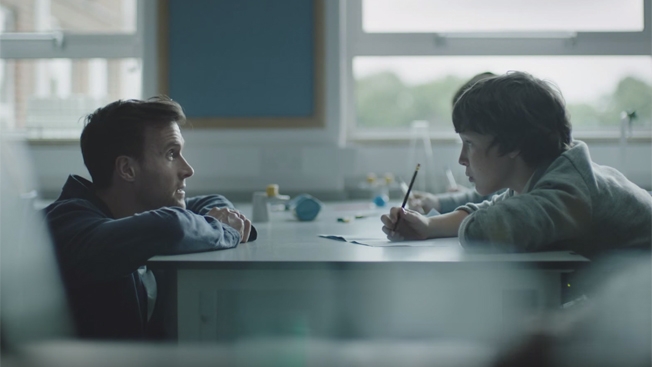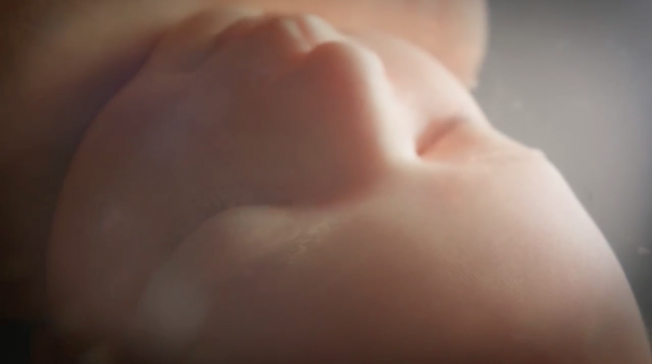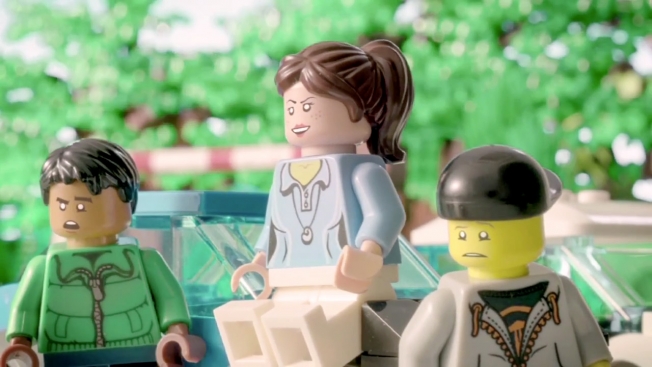A Father Gets to Say the Goodbye He Couldn't in This Chilling Campaign About Heart Disease
Posted in: Uncategorized
This quietly terrifying multi-channel campaign from the British Heart Foundation strives to keep its audience off balance in more ways than one.
Surprise is the key theme of the campaign, breaking today via DLKWLowe in London. Each facet mimics the swiftness and unexpectedness of the malady itself.
“Compared to other terminal illnesses, like cancer, heart disease can be especially cruel,” Dave Henderson, chief creative officer at DLKWLowe, tells AdFreak. “Its suddenness means families often never get the chance to even say goodbye, which has a huge emotional impact on those left behind.”
A minute-long TV commercial, “Classroom,” directed by Tom Tagholm of Park Pictures, shows a whispered conversation between father and son, hinting from the very beginning that something isn’t right.
The twist itself isn’t that hard to guess. But the dawning realization of what’s coming increases the story’s power—it becomes more and more unsettling as it progresses. In the end, it’s clear that as that as sad as this conversation is, it’s sadder still that when dealing with heart disease in real life, people don’t get to have those talks. The tagline drives home that point: “Heart disease is heartless. It strikes without warning.”
Ultimately, the organization is seeking help from viewers. “By making people contemplate the unexpected devastation that heart disease causes, we hope to inspire people to donate funds to continue BHF’s lifesaving research,” says Carolan Davidge, the client’s director of marketing and engagement.
“I don’t think we can tip toe around a disease that’s so cruel anymore,” adds Henderson. “We have to hit people with the reality of what we’re dealing with here. And the impact and reality of heart disease is personal to every person so each piece of creative in this campaign seeks to speak to different audiences.”
Several online spots created by Make, the DLKWLowe’s in-house production company, have a different tone and feel than “Classroom,” though they ultimately pack a similar punch.
In one, a Skype chat between a youngish mom and dad on their fifth wedding anniversary ends particularly badly.
In another, a backyard game of catch turns into a tragic afternoon for a cute pooch and its owner.
For some, that approach may seem unintentionally humorous (in a dark sort of way), even verging on parody. Still, the sense of disorientation and confusion—the WTF! moment, if you will—is exactly what the spots are all about. This is how quickly lives can irreparably, irreversibly change for the worse.
Meanwhile, in a mini-doc, real heart-disease patients keep the beat to remind us that one in four who are stricken don’t survive.
In an effort to make the message even more personal, there’s even a “Heart Attack Simulator.” A mobile app that asks users to hold their phones against their hearts, it delivers a jolt that isn’t so much physical as emotional—the phone rings, and a chilling recorded message, the kind no one wants to receive, begins to play.
Overall, each element of the wide-ranging campaign has a distinctive flavor, but they all manage to stay on point, memorably delivering the message. And while fear-based advertising can be tough to stomach, that’s a small price to pay for the possibility of preventing more lives from suddenly sliding into ruin and despair.







